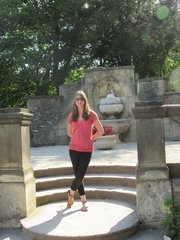|
By Bernadette Wilczek I was born to an American mother and Polish father. We spoke English at home and I seldom herd Polish spoken outside of parties with my father’s family. It wasn’t until middle school that I became aware of my Polish identity. Growing up in the southwest suburbs of Chicago, I was surrounded by American families with little knowledge of foreign cultures. At my birthday parties, I saw the amazement on my friends’ faces when they heard the language that was a comforting background noise to me. I then began to identify myself as Polish. In High School, I discovered that my mother’s grandmother was also Polish and could communicate with my father’s family in her native language (the language and cultural identity ended with her on my mother’s side). My interest of my Polish heritage peaked. I wanted to learn more about my mother’s heritage, I desired to know more about where my father was born, I thirsted for the ability to speak Polish. I enrolled in a Polish language class my first semester at university. My time finally came to immerse myself in my Polish cultural heritage. I would finally have a real claim to my Polish identity. I slowly started to realize through my meeting of other Polish students that my memories and practice of Polish culture did not match theirs. I couldn’t understand some of their words, the Polish words my family spoke did not match theirs nor the words I was learning in class. The accents of my family members were familiar and comforting while the accents I was hearing in university were anything but and discouraged me. Two years past and I visited Poland for the first time. I went with a study group consisting of both Polish and non-Polish speakers and toured my father’s country. Every Polish person I encountered assumed that I could speak fluent Polish thereby affirming my Polish self- identification, but I couldn’t always understand them. After the eleven days I spent with the group, I continued my stay for two months visiting my father’s family. This was the picture of Poland I grew up hearing about (minus the oppressive communist government). I spent time with cows and explored the mountains. I saw the three-room log cabin that my dad spent many nights at. I saw the house my grandfather built but never lived in. The people spoke my comforting Polish. I attended a traditional, Góralskie[1] wedding. The music and songs that I used to hear on my grandparents’ deck on summer evenings returned. Three days of drinking, eating and dancing. I was in my element. Returning to the states and to class again, I noticed that not only did I have difficulties understanding my peers, but their notions of family and home life differed greatly from the performance of Polishness that I knew and loved. I came to an understanding that I could no longer identify myself as Polish as I once did in Grade School. I was a Góralka[2], and belonged to the customs and distinct Polish dialect that comes with it. Our voices are loud so they can carry across the mountains. Our words are shared with our Slovakian brethren on the other side of the mountains. Our connection to our homeland and culture will never die. [1] The Górale, or Highlanders in English, are people located in area in the South of Poland between the cities of Nowy Targ and Zakopane, also known as Podhale. Their dialect differs from the standard Polish with different words, grammar, and sentence structure. For more information visit Thaddeus V Gromada’s blog at tgromada @mindspring.com
[2] Female form of Górale
0 Comments
Leave a Reply. |
Hi Stranger!Have a story to tell? Something interesting that you want to share?Then click here for more details, if you're interested in submitting your own thoughts or personal story on this page! ArchivesCategories |

 RSS Feed
RSS Feed
